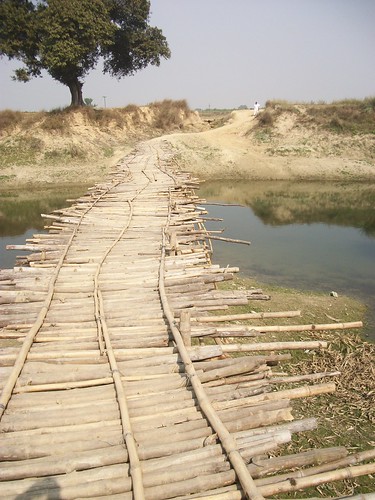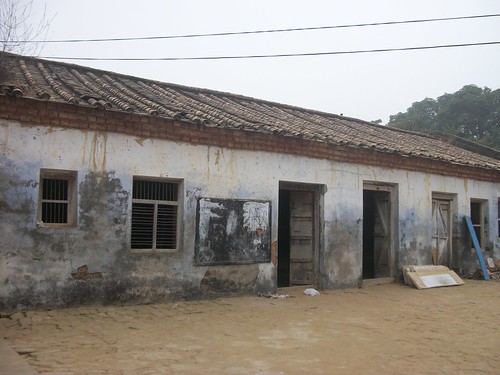By Abu Zafar, IANS,
Muslimpatti (Azamgarh) : It is a milestone in education for this remote village in Azamgarh district — 90 percent of its girls are educated and the number of girl students is over double that of boy students in nearby schools and colleges.
Surrounded on three sides by the Tamsa river, the villagers of Muslimpatti, 20 km from Azamgarh city and 250 km from state capital Lucknow, established a girl’s high school 10 years ago with public donations to provide quality education to girls near their homes.

Bamboo bridge in Muslimpatti village of Azamgarh
The village has a population of 7,000 consisting of 60 percent Muslims and 40 percent Hindus. Over 50 percent men are out of the village due to business, service and education.
“Earlier, it was a dream to educate our daughters, but now it is a reality,” Hasan Arif, who played a key role in establishing the school, told IANS.
“Ninety percent girls are educated here. You can’t find a single home which doesn’t have at least one educated woman, ” the 72-year-old graduate in agriculture from Deen Dayal Upadhyay University in Gorakhpur added.
The Muslimpatti Junior Niswan High School was established in 2000 with Rs.8 lakh collected through public donations. The nearest schools were just five kilometres from the village but due to the co-education system and safety fears, parents rarely sent their daughters there.
Arif said, “Here girls are more interested in education. A school bus does come, but sending them far was not safe.”
There is no way to connect 60 villages, including Muslimpatti, to state highway 34 and 30 and educational institutions. Villagers walk across a bamboo bridge each year but it is hard to cross.
Villager Naeem Ahmad felt “the only option was to send them 12 km away to Beenapara, an educational hub in Azamgarh, but it is hard to cross the Tamsa river.”
“Our legs used to shake while crossing the bridge. We had to stay home in the rainy season due to the floodwater over the bridge,” said Nazia Bano who completed her Class 10 from Beenapara.
Even now, there is no school for boys and they have to go through the same bridge for education.
Several personalities like Gen Mirza Sultan Ahmad Beg, who was a judicial member in the Uttar Pradesh Board of Revenue in 1948, and Mirza Aslam Beg, ex-chief of the army staff of the Pakistan Army, hailed from this village.
Arif wants to make the school, which is now till Class 10, grow up to Class 12 but is facing several challenges like lack of resources.

Maktab Islamia of Muslimpatti village which was established at 1842
“We have laid the stone here. Let us see what happens. If our daughters are educated, then at least they can teach their own children,” he added.
The teachers’ salary is less than Rs.2,000 each per month. Mirza Shabbir, manager of the school, said: “We don’t have the earnings to pay teachers much.”
Salman Sultan, a resident of Muslimpatti who teaches chemistry and also heads the computer science department in the Shibli National Post Graduate College in Azamgarh, is hopeful about the future of the village but wants a change in the attitude of people.
“I am hopeful for my village, which was once the most educated village in Azamgarh district. However, this requires a change in the lethargic and indifferent attitude of villagers,” said Sultan.
(Abu Zafar can be contacted at [email protected])

